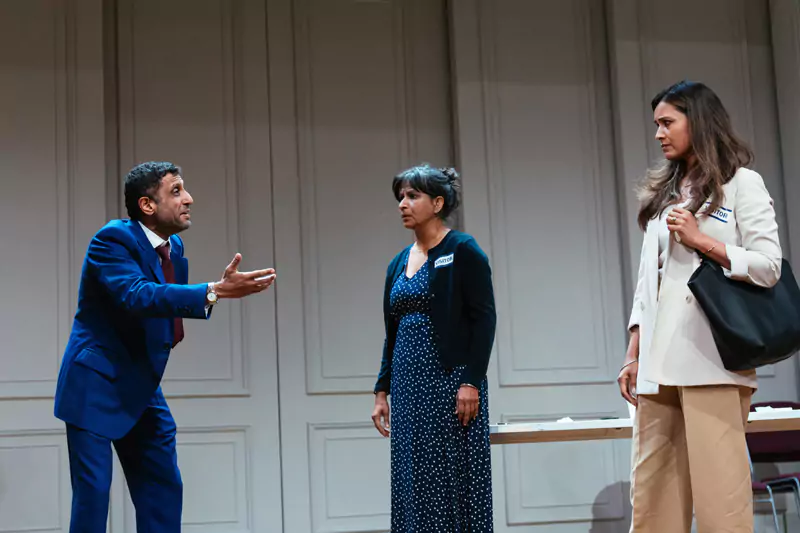“The Estate” at Dorfman, National Theatre
Neil Dowden on the South Bank
19 July 2025
Shaan Sahota’s impressive debut play The Estate is an intoxicating cocktail of political satire and family drama, exploring issues of race and patriarchy. There’s scandal and intrigue in Westminster, with parental abuse and sibling rivalry at home. The two halves don’t always gel, and there are sharp changes in tone, veering suddenly from farce to tragedy, from hilarity to shock – but for the most part it works in an entertaining rollercoaster of emotions boosted by a riveting lead performance from Adeel Akhtar.

Adeel Akhtar as Angad.
Photo credit: Helen Murray.
After the leader of the opposition resigns following an affair with an 18-year-old girl with only a year to the next general election, Shadow Secretary of State for the Environment, Food and Rural Affairs Angad Singh – a British Sikh – agrees to back another MP though he has misgivings about it being a “coronation”. But when his father dies suddenly and he realizes from the number of shadow cabinet colleagues who come to the funeral how much support he has, he decides to stand for leader himself and after some political shenanigans becomes favourite. However, a quarrel with his two older sisters over the estate of their late father – who has left everything to Angad – threatens to cause a public disgrace ending his hopes.
The play starts off in full comic mode in a parliamentary office like a less foul-mouthed version of The Thick of It as party politics is lampooned. Communications special advisor Petra and policy assistant Isaac encourage the mild-mannered Angad to run for the leadership, but he is persuaded by the dominating opposition chief whip Ralph (with whom he was at Harrow and Oxford) to endorse a colleague despite his dodgy sexual reputation. His later decision to run himself is regarded as a betrayal, and leads to the leaking of a video of him in a school initiation rite of group masturbation (surely an allusion to David Cameron’s “Piggate”). But Angad shows a ruthless streak by blackmailing Ralph into switching to him.
Although Angad’s pregnant wife Sangeeta supports him, his sisters Gyan and Malicka are upset and angry at being left out of their father’s will and threaten to expose him if he doesn’t fulfil his earlier promise to give them equal shares. Angad makes political use of the backstory of his dad immigrating to Britain and working as baggage handler, but it turns out he became a wealthy slum landlord – as well as being an abusive parent who beat his son and put down his daughters. Sahota shows how, as his ambitions grow, Angad becomes more like his father including in a violent showdown with his sisters just before his leadership speech to the party for which he is standing – ironically – on a platform of change.

Adeel Akhtar, Thusitha Jayasundera and Shelley Conn.
Photo credit: Helen Murray.
Angad’s party is unnamed but it seems to fit more with the Conservatives, who have recently had a number of senior British Asian ministers, including prime minister Rishi Sunak – who like Angad went to a top public school and Oxford. The Estate was originally written in 2020, and it may well have heavily revised in the light of recent events, but rather strangely there are no specific details that refer to current affairs. Sahota is more interested in hierarchical power structures within society and family, especially male primogeniture within a particular community. Although gender divisions arise there too, this is a very different portrait of a Sikh family than the one in Marriage Material at Lyric Hammersmith earlier this year.
Director Daniel Raggett (who helmed the recent Sheffield Theatres’ dynamic production of Accidental Death of an Anarchist) adroitly navigates the abrupt lurches in mood of a play that sometimes doesn’t seem to know where it’s going but always makes you want to go along for the ride. Chloe Lamford’s slick design contains a cramped office at front of stage, with sliding doors opening behind to reveal a more spacious gurdwara, or luxury home. Composer Asaf Zohar’s driving drum’n’bass maintains the pace during scene changes.
As Angad, Akhtar (best known for his screen work, winning BAFTAs for Murdered by My Father and Sherwood, but who also made a big impact as Lopakhin in The Cherry Orchard at Donmar Warehouse last year) delivers such an intensely physical performance of coiled tension that it makes it hard to keep your eyes off him. Small in stature, slightly hunched, and softly spoken early on, he portrays Angad as a self-effacing, affable man with asthma who is liable in moments of stress to have full-on panic attacks. But, a survivor of bullying at school and at home, he reveals a harder, nastier side as we see him – shadowed by the spirit of his father – asserting his rising power as Akhtar’s body language becomes increasingly forceful.
The rest of the cast are also excellent. Dinita Gohil plays the slightly underwritten role of Angad’s trophy wife Sangeeta exuding privilege who criticizes his misbehaviour but then seemingly accepts it. Thusitha Jayasundera is Angad’s more sympathetic elder sister Gyan (a doctor who looked after him when he was a boy), while Shelley Conn’s embittered Malicka does not hold back on her demands for equality. Helena Wilson is amusing as the posh spad Petra, as is Fode Simbo as the confused diversity beneficiary Isaac, while Humphrey Ker makes the most of his towering height as the imposing but shallow Ralph who represents the absurdly privileged establishment.









